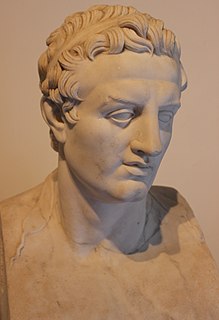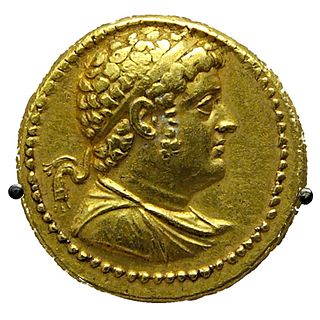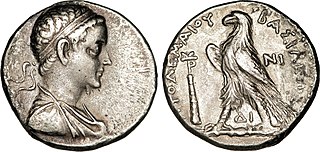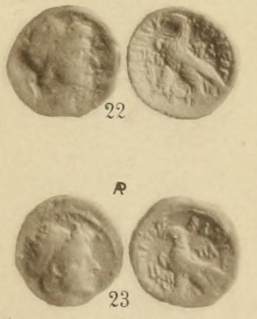
The Ptolemaic dynasty, sometimes also known as the Lagids or Lagidae, was a Macedonian Greek royal family, which ruled the Ptolemaic Kingdom in Egypt during the Hellenistic period. Their rule lasted for 275 years, from 305 to 30 BC. They were the last dynasty of ancient Egypt.

Cleopatra VII Philopator was the last active ruler of the Ptolemaic Kingdom of Egypt, nominally survived as pharaoh by her son Caesarion. She was also a diplomat, naval commander, linguist, and medical author. As a member of the Ptolemaic dynasty, she was a descendant of its founder Ptolemy I Soter, a Macedonian Greek general and companion of Alexander the Great. After the death of Cleopatra, Egypt became a province of the Roman Empire, marking the end of the Hellenistic period that had lasted since the reign of Alexander. Her native language was Koine Greek and she was the first Ptolemaic ruler to learn the Egyptian language.

Ptolemy III Euergetes was the third king of the Ptolemaic dynasty in Egypt from 246 to 222 BC.

Ptolemy I Soter was a companion and historian of Alexander the Great who succeeded to his empire. Ptolemy became ruler of Egypt and founded the Ptolemaic dynasty which ruled it for the next three centuries, turning Egypt into a Hellenistic kingdom and Alexandria into a center of Greek culture.

Ptolemy II Philadelphus was the king of Ptolemaic Egypt from 283 to 246 BCE. He was the son of Ptolemy I Soter, the Macedonian Greek general of Alexander the Great who founded the Ptolemaic Kingdom after the death of Alexander, and queen Berenice I, originally from Macedon in northern Greece.

Ptolemy IV Philopator, son of Ptolemy III and Berenice II, was the fourth Pharaoh of Ptolemaic Egypt from 221 to 204 BC. The decline of the Ptolemaic dynasty began under the reign of Ptolemy IV.

Ptolemy V Epiphanes ; 210–181 BC), son of Ptolemy IV Philopator and Arsinoe III of Egypt, was the fifth ruler of the Ptolemaic dynasty from 204 to 181 BC. He inherited the throne at the age of five, and under a series of regents, the kingdom was paralyzed. The Rosetta Stone was produced during his reign as an adult.

Ptolemy VI Philometor ; c. 186–145 BC) was a king of Egypt from the Ptolemaic period. He reigned from 180 to 164 BC and from 163 to 145 BC.

Ptolemy VII Neos Philopator was an Egyptian king of the Ptolemaic period. His reign is controversial, and it is possible that he did not reign at all, but was only granted royal dignity posthumously.

Ptolemy Neos Dionysos Theos Philopator Theos Philadelphos was a pharaoh of the Ptolemaic dynasty of Ancient Egypt. He was commonly known as Auletes, referring to the king's love of playing the flute in Dionysian festivals.
Ptolemy IX Soter II, commonly nicknamed Lathyros, reigned twice as king of Ptolemaic Egypt. He took the throne after the death of his father Ptolemy VIII in 116 BC, in joint rule with his mother Cleopatra III.
Ptolemy XI Alexander II was a member of the Ptolemaic dynasty who ruled Egypt for a few days in 80 BC.
Ptolemy X Alexander I was King of Egypt from 110 BC to 109 BC and 107 BC till his death in 88 BC, in co-regency with his mother Cleopatra III until 101 BC, and then possibly with his niece-wife Berenice III.

Cleopatra III was a queen of Egypt. She ruled at first with her mother Cleopatra II and husband Ptolemy VIII from 142 to 131 BC and again from 127 to 116 BC. She then ruled with her sons Ptolemy IX and Ptolemy X from 116 to 101 BC.

The Ptolemaic Kingdom was a Hellenistic kingdom based in ancient Egypt. It was ruled by the Ptolemaic dynasty, which started with Ptolemy I Soter's accession after the death of Alexander the Great in 323 BC and which ended with the death of Cleopatra and the Roman conquest in 30 BC.
The Lucuidonenses were an ancient people of Sardinia, noted by Ptolemy. They dwelt south of the Carenses and the Cunusitani and north of the Æsaronenses.
The Balares were one of the three major groups among which the Nuragic Sardinians considered themselves divided.












